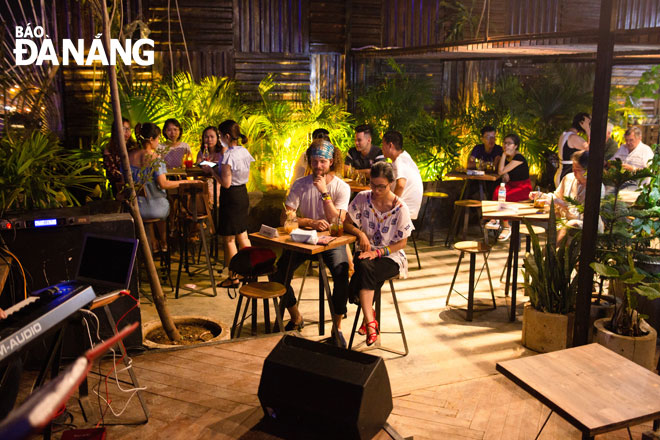Quality of locally-offered tourism services needs to be enhanced
Recent times have seen a boom in the number of businesses participating in tapping the great potential of Da Nang’s tourism market. However, their lower-than-expected service quality has adversely afftected the local tourism ecosystem.
 |
| Low-cost accommodation establishments have shown their interest in creating special services for their clients. Customers are pictured enjoying relaxing moments at The Secret Garden Da Nang. |
In his perspectives, Mr Le Thai Bao Long, the Director of the city-based Truong Sa tourism company, pointed out to the fact that cheap services now make Da Nang get more cramped with tourists, but the added value is not high. Therefore, it is high time for local tourism businesses to really attach importance to promoting their product quality in order to fully tap the local tourism ecosystem potential in a sustainable manner.
With only a few dozen staff members, but every year, the Truong Sa company generates millions of US$ in revenue, and this encouraging sign clearly demonstrates its right development orientations in which service quality is identified as the top priority.
The rapid growth of the Truong Sa company has been mainly attributed to its good performance in offering M.I.C.E (Meetings-Incentives-Conferences-Exhibitions) services.
In reality, M.I.C.E which can bring in much higher revenue for the city than the other types of tourism because it attracts a large number of high-end visitors, and this is the key product helping Viet Nam’s tourism brand deeply penetrate into the global market.
Given the strongly growing MICE market, Truong Sa has made a strong commitment to offering its clients M.I.C.E packages which fully tap the tourism ecosystem featuring the distinctive beauty of the land and people of this tourist-packed seaside city.
For the sake of the whole city’s tourism industry, Truong Sa say ‘no’ to low-cost tours, especially an upward trend in the so-called 1US$ ones which have resulted in the unfair competitive environment between travel businesses, the low quality of tourism services, and tax losses to the city budget.
Meanwhile, the city has seen a growing number of hostels and homestays operating in a spontaneous manner and toughly competing with one another in terms of product prices, which may lead to a decline in their service quality.
Mr Mac Bao Khanh, the Director of the Mac Bao Gia Co., Ltd, the developer of The Vietnam Hostel located at 22-24-26 Hung Vuong, pointed out to the fact that the city is facing a shortage of specific operation regulations about hostels and homestays as well as an overlap in management activities.
He underlined an urgent need for the city to release standards for these accommodation services to ensure the best possible quality for customers.
As a short-term solution, relevant agencies should publicise necessary regulations on accommodation services amongst hostel and homestay providers as well as raise their awareness of heading towards a fair competition in terms of quality.
In addition, the local authorities should tighten checks over the operation of these accommodation establishments to identify whether or not they meet requirements on such aspects as fire prevention and fighting and temporary residence declarations.
In particular, it is suggested that the municipal Department of Tourism build up standards for homestay and hostel segments, and tourism services as a whole.
Another measure is that there should be a linkage with online travel agents (OTAs) so as to create electronic travel guide publications on such recommendations as what to eat, what to do and where to relax in the city, in a bid to ensure good service quality.
It is also worth recommending that a list of highly prestigious tourism providers can be displayed on the city’s official tourism websites and OTAs. In fact, the closer the connection between the city authorities and these OTAs is, the more attractive tourism information is, the more travellers the city welcomes.
Last, but not least, local tourism businesses should speed up their cooperative ties with unified development directions so as to increase their revenues and enhance product values.